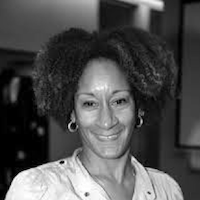Identity | Jennifer Adams
"My definition of identity is very contextual and has shifted even from the time that I started looking at identity until now."

2017 Interview Highlights:
Can you tell us about any of your projects that involve identity?
I’ve done a lot of projects on identity. In most of my research, identity is either very central or peripheral. I started out looking at informal science learning experiences and how that shapes their identities as teachers. Preeti Gupta and I looked at youth identity in informal science learning spaces, and we wrote a little bit about young women’s identities and STEM through their relationship with informal science learning. Then I did some work around place identity and sense of place. My most recent work is focusing on STEM teachers, science teachers, and their identity in relation to informal science learning.
How do you define identity?
It’s very contextual. It’s shifted even between the time that I first started looking at identity and now. I think what’s remained at the core, though, are the notions of identity, agency, and learning and how those are all related to each other. As a person is learning in a given context, they develop a particular sense of agency there. That therefore contributes to their identity, being like themselves or being seen by others as a particular type of person.
How do you see the relationship between agency and identity?
First, there’s learning. As you learn, whether through formal or informal means, and as you become part of a community, you develop a sense of agency about being able to contribute to that community, and that becomes your identity.
As a beginning flamenco dancer, for example, you don’t really consider that to be part of your identity because you don’t know a lot of the terms or a lot of the particular background or baseline things. As you learn, you’re able to contribute through choreography and through performances so that you come to identify as a flamenco dancer. It’s the same thing in any endeavor. As people learn, they develop agency, they become able to make changes and to shape things in that field, and through that they learn to identify in that field.
That identity in the field is not a monolithic identity. It’s not like they become only a flamenco dancer, or a science teacher, or a scientist. They’re still going to be multiple facets of that identity or that label, because of all the other social identities that the person is bringing into that setting.
What kind of methodologies are you using?
I’m developing more of a grounded theory and I’m looking to see how it emerges in my data. A lot of the data that I collect are very narrative in form. We have ongoing meetings with the teachers. I have one-on-one dialogues with them. I’ve gone with them on their field trips, not necessarily as a participant observer but just along with them. Just observing them and their students, how they interact with their students, and how their students interact in these different spaces that we bring them into. I’ve used discourse analysis and narrative analysis to really see how they talk about themselves and how they talk about their students.
It’s very emergent because I think it would be very hard to use one tool to measure an identity. I think that if we start to think about measuring science identities, it’s going to lend itself more toward a hegemonic notion of science. It’s going to exclude a lot of people because they’re not going to fit those measures.
How do you think about interest or motivation in identity?
It’s different for different people, but I do think that the interests and motivations that people have are going to be somehow related to their identity. Identity is about positioning and how you want others to see you. Science is still perceived as being an elite pursuit, an elite subject. People want to be identified with that, so that might be their motivation for attending a science café, for example, even if they’re not necessarily interested in the topic. It is about whom you want to be seen as. It’s about whom you aspire to be, and that has to do with motivation.
If somebody was developing a project on identity, how they should think about measuring it?
The measuring is the tough part because it’s such an intersectional topic. If you’re writing a proposal, you do have to make it as linear as possible for readers, so I would encourage people to think about and diagram out the constructs that they think contribute to identity in that given context. They should state the outcomes that they would want to see from people in relation to science, maybe not labeling it as a science identity, but thinking about it as multiple science identities. What are the different ways that people engage in science? What are the ways that people engage in science with agency?